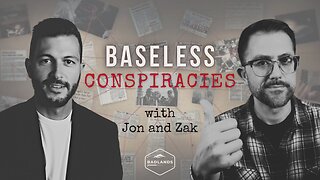Premium Only Content

Episode 3220: Book of the Bible: Nahum
Book of the Bible – Nahum
Nahum: God’s Justice Against the Proud
Opening Prayer
In the name of the Father, and of the Son, and of the Holy Ghost. Amen.
Come, Holy Ghost, fill the hearts of Thy faithful and enkindle in them the fire of Thy love. Lord, just as You humbled Nineveh and comforted Judah, humble our pride and console us in our trials. Through the intercession of Our Lady, Queen of Prophets, keep us faithful to Your word. We ask this through Christ our Lord. Amen.
Introduction
• Welcome listeners.
• Introduce the theme: The Book of Nahum — one of the so-called Minor Prophets, only three chapters long, but filled with timeless lessons about God’s sovereignty, justice, and mercy.
• Context: Nahum speaks of the fall of Nineveh, capital of Assyria, an empire notorious for its brutality. At the time, Assyria seemed invincible — but God declared its fall.
• Purpose: To show that no earthly power can stand against God, and to give comfort to the faithful who suffer under oppression.
Scripture Reading:
“The burden of Nineveh. The book of the vision of Nahum
Historical and Spiritual Context
1. Assyria: The Cruel Conquerors
The Assyrian Empire dominated the ancient Near East during the 9th–7th centuries B.C. Known for its brutality, Assyria perfected the art of psychological warfare. Ancient reliefs show prisoners being flayed alive, impaled on stakes, or led away in chains with hooks in their lips. Their armies left smoking ruins behind them as a warning to all who resisted.
Biblical Witness:
• In 2 Kings 17, we read how Assyria conquered the Northern Kingdom of Israel in 722 B.C. under King Shalmaneser and Sargon II.
• The Israelites were deported, scattered across the empire, giving rise to the “Ten Lost Tribes.”
Spiritual Parallel: Assyria represents not just a political empire, but the spirit of oppression — the worldly power that exalts itself against God and enslaves His people.
2. Nineveh: The Great City
Nineveh was Assyria’s capital, located on the eastern bank of the Tigris River (modern-day Mosul, Iraq). It was legendary for its size, strength, and wealth.
• Ancient historians describe its walls as 100 feet high, with towers rising even higher.
• The walls were so wide that three chariots could ride abreast on top of them.
• The city was filled with gardens, temples, palaces, and treasures plundered from countless nations.
To human eyes, Nineveh seemed invincible a fortress city that could never fall. But Nahum’s prophecy reminds us that no city is stronger than God’s decree.
3. Jonah: A Warning Ignored
A century before Nahum, God sent another prophet to Nineveh: Jonah.
• Jonah reluctantly preached: “Yet forty days, and Nineveh shall be destroyed.” (Jonah 3:4).
• Amazingly, the people repented: “And God saw their works, that they were turned from their evil way: and God had mercy with regard to the evil which He had said that He would do to them, and He did it not.” (Jonah 3:10).
But Nineveh’s repentance was temporary. Without true conversion of heart, their old sins of bloodshed, arrogance, and idolatry returned.
Lesson: Repentance that does not take root in the soul soon withers. Conversion must be lasting, not momentary.
4. Nahum’s Time: Return to Arrogance
By the time Nahum wrote (around 650–630 B.C.), Nineveh had grown even more arrogant.
• They were called the “city of blood” (Nahum 3:1) for their cruelty.
• They boasted of their power, crushing nations like Israel and humiliating Judah.
• They worshipped false gods and trusted in wealth, armies, and walls instead of the true God.
Nahum’s prophecy is therefore not just about Nineveh’s fate, but about the principle of divine justice: no nation can exalt itself above God and endure forever.
Reflection
History shows that repentance without conversion is fleeting. Nineveh once wore sackcloth and ashes at Jonah’s preaching but later returned to its sins. The same is true of individuals, communities, and even nations. Without humility and fidelity, we repeat the cycle of pride, sin, and destruction.
For Catholics today: moments of repentance at confession, at missions, at retreats must be transformed into a life of conversion, otherwise we risk falling back into old sins as Nineveh did.
Saintly Insight
St. Jerome, in his commentary on the prophets, called Nahum “a prophet of consolation.” Why? Because while his message is one of doom for Nineveh, it is also one of comfort for Judah.
Even when surrounded by oppressors, the faithful are reminded that God sees their suffering and will act in His time. Divine justice is not always immediate, but it is certain.
St. Jerome’s insight invites us to see Nahum not as a “prophet of wrath,” but as a prophet of hope teaching that the proud fall, but the faithful endure.
Takeaway for Today
1. Assyria reminds us of worldly powers that dominate by fear and cruelty.
2. Nineveh reminds us of worldly pride that trusts in walls, wealth, and armies.
3. Jonah and Nahum remind us of the need for ongoing conversion. One act of repentance is not enough; it must become a way of life.
4. St. Jerome reminds us that God’s justice is consoling, not terrifying, for the faithful.
Suggested Meditation Question for Listeners:
Where in my own life am I tempted to be like Nineveh proud, self-reliant, unwilling to remain in true conversion? How can I make my repentance lasting rather than temporary?”
Chapter 1: God the Avenger, God the Stronghold
Scripture Reading (Douay–Rheims)
“The Lord is a jealous God, and a revenger: the Lord is a revenger, and hath wrath: the Lord taketh vengeance on His adversaries, and He is angry with His enemies. The Lord is patient, and great in power, and will not cleanse and acquit the guilty. The Lord is good, and giveth strength in the day of trouble: and knoweth them that hope in Him.”
(Nahum 1:2–3, 7)
1. God as the Divine Warrior
Nahum begins with an image of God that is both majestic and terrifying. Unlike the gods of the pagans silent idols of stone and wood — the true God is alive, jealous for His glory, and active in history.
• He is described as a jealous God (El qanna in Hebrew) — not with human envy, but with divine zeal. He will not share His glory with idols or tolerate the oppression of His people.
• He is a revenger, which means He is not indifferent to injustice. Where human rulers fail to punish evil, God will.
• The natural world becomes His weapon: storms, whirlwinds, earthquakes, and floods respond to His command.
Key Contrast: In pagan mythology, storms and earthquakes were controlled by rival gods. Nahum proclaims boldly: the Lord alone commands creation. Nature itself is the army of the Almighty.
2. God’s Justice Balanced with His Patience
Nahum immediately tempers the vision of God’s wrath with an essential truth:
• “The Lord is patient, and great in power” (v. 3).
• His patience does not mean weakness. Instead, it reveals His mercy, giving sinners time to repent.
• Yet, Nahum adds: “He will not cleanse and acquit the guilty.” Injustice will not go unanswered forever.
Patristic Insight:
• St. Augustine in City of God (Bk. 1) wrote that God’s patience is a test: “God is patient, because He is eternal; He awaits the conversion of the wicked, yet reserves judgment for the unrepentant.”
• St. Jerome noted that Nineveh’s earlier repentance at Jonah’s preaching showed God’s patience, but their later fall under Nahum showed God’s justice.
3. Consolation for the Faithful
Nahum then turns from wrath to mercy:
• “The Lord is good, and giveth strength in the day of trouble: and knoweth them that hope in Him” (v. 7).
• For the wicked, God’s power is terror; for the faithful, His power is safety.
• The Hebrew phrase “knoweth them that hope in Him” implies intimate recognition God not only sees but embraces those who trust Him.
Catholic Application: In times of persecution whether from governments, false religions, or even corruption within the Church God is the fortress of the faithful. He does not abandon His remnant.
4. Spiritual Application
Nahum’s vision reminds us that:
• Evil is not unchecked; it is only delayed judgment.
• God’s patience should never be mistaken for His approval.
• When the appointed time comes, His judgment will be sudden and complete.
For Our Times:
• In an age where evil seems triumphant — abortion defended as a “right,” marriage redefined, truth rejected — Catholics can be tempted to despair.
• Nahum tells us: God’s justice is not absent, it is patient. He waits so that souls may repent, but His final judgment is certain.
5. Reflection and Meditation
• For the wicked: God is the storm that tears down their fortress.
• For the faithful: God is the fortress that protects them in the storm.
Meditation Question for Listeners:
“Do I see God’s patience as an opportunity for deeper conversion, or do I abuse His patience by delaying repentance? Do I rest in His justice when I see evil prosper, or do I lose hope?”
Summary of Segment 2
Chapter 1 of Nahum reveals the paradox of God: patient yet just, merciful yet wrathful, terrifying to His enemies yet consoling to His friends. He is the Divine Warrior who fights for His people, the Stronghold in the day of distress, and the Judge of nations.
Suggested Short Prayer to Close the Segment
“O Lord, just Judge and merciful Father, teach us to rest in Your patience and fear Your justice. Protect us in our trials, and grant that we may be among those who hope in You. Through Christ our Lord. Amen.”
Segment 3: The Siege of Nineveh
Scripture Reading (Douay–Rheims)
“The shield of His mighty men is like fire, the men of the army are clad in scarlet: the chariots are like fire of lamps in the day of His preparation, and the drivers are stupefied. … Behold I come against thee, saith the Lord of hosts, and I will burn thy chariots even to smoke.”
(Nahum 2:3, 13)
1. The Battle Imagery
Nahum gives a poetic and almost cinematic description of Nineveh’s fall:
• Soldiers are clad in scarlet — possibly reflecting the uniforms of the Medes and Babylonians, who would attack Nineveh.
• Shields gleam like fire, perhaps reflecting the sun or the flash of weapons.
• Chariots race wildly through the streets, their wheels spinning like flames.
• The drivers are “stupefied” — either from panic or divine confusion.
The once-ordered, disciplined army of Nineveh is reduced to chaos. What Nineveh trusted for protection becomes a scene of madness.
Note: The Hebrew word for “stupefied” carries the sense of staggering or reeling — God Himself has taken away their reason, fulfilling the prayer of Psalm 68:2: “Let God arise, and let His enemies be scattered: and let them that hate Him flee from before His face.”
2. The Collapse of Nineveh’s Walls
Archaeological records tell us that Nineveh’s walls were massive — 100 feet high, 50 feet thick, and stretching for seven miles. Yet, in 612 B.C., the Babylonians and Medes laid siege. Ancient accounts say heavy rains caused part of the wall to collapse, opening the way for the invaders.
Nahum’s prophecy seems to anticipate this: walls that seemed impregnable were breached not merely by men, but by God’s providence using nature itself.
Lesson: The strongest human defenses crumble when God decrees judgment.
3. The Lion’s Den is Emptied
Later in Chapter 2, Nahum compares Nineveh to a lion’s den:
“Where is the dwelling of the lions, and the feeding place of the young lions?” (Nahum 2:11).
• The lion was Assyria’s national symbol — powerful, feared, devouring its prey.
• But the lion’s den is now empty. The predator has become the prey.
Patristic Reflection:
• St. Jerome observed that God often turns worldly power against itself the lion devours until there is nothing left, and then starves.
• The Fathers saw this as a warning: kingdoms that live by cruelty eventually consume themselves.
4. The Divine Verdict
The climax of the chapter comes in verse 13:
“Behold, I am against thee, saith the Lord of hosts, and I will burn thy chariots even to smoke.”
This refrain — “I am against thee” — is terrifying.
• No army, no wall, no wealth can withstand when God Himself becomes the enemy of a nation.
• Chariots, symbols of military strength, are reduced to smoke.
Catholic Note: This recalls Christ’s words to Saul on the road to Damascus: “It is hard for thee to kick against the goad” (Acts 9:5). To oppose God is to wage a hopeless battle.
5. Spiritual Application
What does this mean for us?
• For Nations: Any empire built on violence, pride, and injustice will fall. History proves it: Assyria, Babylon, Rome, and countless others. Only the Kingdom of Christ endures.
• For the Church: We may feel small compared to the modern “empires” of secularism, relativism, and global powers. Yet Nahum reminds us: they too will fall when God declares judgment.
• For the Individual Soul: Pride makes us build our own “walls” — wealth, reputation, self-sufficiency. But when God is against those walls, they crumble. Only humility keeps us safe.
6. Reflection and Meditation
• The fall of Nineveh is not just a historical event; it is a warning and a comfort.
• Warning: The proud and violent will be humbled.
• Comfort: God fights for His people.
Meditation Question for Listeners:
“What are the ‘walls’ I rely on instead of God — security, wealth, pride, or human approval? Do I recognize that these can fall in an instant if God is not my stronghold?”
Summary
Nahum’s description of the siege is vivid and terrifying. Chariots blaze, soldiers panic, walls collapse, treasures are plundered, and the lion’s den is stripped bare. The refrain rings out: “Behold, I am against thee, saith the Lord of hosts.”
It is a reminder for every age: when God declares judgment, no power can stand. The strongest city, the mightiest empire, the proudest man all are dust before Him.
Suggested Short Prayer to Close the Segment
“O Lord of Hosts, who brought down the pride of Nineveh, teach us not to trust in walls of our own making, but to place our hope in You alone. Burn away our pride, and make us humble lions of Your Kingdom, strong only in Your grace. Through Christ our Lord. Amen.”
Segment 4: Chapter 3: Woe to Nineveh
Scripture Reading (Douay–Rheims)
“Woe to the city of blood, all full of lies and violence, rapine shall not depart from her. Because of the multitude of the fornications of the harlot that is all beautiful, and agreeable, that maketh use of witchcraft, that selleth nations through her fornications, and families through her witchcraft. Behold I come against thee, saith the Lord of hosts: and I will discover thy shame to thy face, and will shew thy nakedness to the nations, and thy ignominy to kingdoms.”
(Nahum 3:1, 4–5)
1. The Indictment Against Nineveh
Nahum pronounces a final “woe” against Nineveh — the capital of the Assyrian Empire. The charges are severe:
• Bloodshed: “Woe to the city of blood” — Assyria built its empire on cruelty, terror, and slaughter. Reliefs from Nineveh’s palaces depict captives being flayed alive or impaled on stakes.
• Lies and Robbery: Nineveh deceived nations with false treaties, only to plunder them later.
• Fornication and Sorcery: This refers to idolatry, alliances with pagan gods, and the corruption of surrounding peoples.
Parallel with Revelation: St. John calls pagan Rome “Babylon the Great, the mother of the fornications” (Revelation 17:5). Nahum’s language foreshadows the same imagery.
2. The Imagery of the Harlot
Nahum compares Nineveh to a harlot: outwardly beautiful and alluring, but inwardly corrupt.
• “She selleth nations through her fornications.” (v. 4)
• Assyria seduced nations with promises of protection and prosperity, but enslaved them instead.
Patristic Insight:
• St. Jerome wrote that Nineveh’s harlotry symbolizes the soul that abandons God for idols. Just as Nineveh prostituted itself with pagan gods, so too the sinner betrays God for fleeting pleasures.
• St. Augustine contrasted the “City of Man,” marked by pride and lust, with the “City of God,” founded on humility and charity. Nineveh is the City of Man in its most violent form.
3. The Shame of Exposure
God declares: “I will discover thy shame to thy face, and will shew thy nakedness to the nations” (v. 5).
• The punishment is not just military defeat, but public humiliation.
• In ancient times, to be stripped naked was the ultimate disgrace — a symbol of being powerless and shamed.
• Nineveh, once clothed in glory, is exposed as corrupt, weak, and mortal.
Lesson: Pride promises glory but ends in humiliation. Every empire or soul that turns from God will one day be exposed.
4. Comparison to Thebes
Nahum recalls the fall of Thebes (No-Ammon) in Egypt:
• “Art thou better than the populous No?” (v. 8).
• Thebes was a mighty city, defended by rivers, allies, and wealth yet it fell.
• If Thebes could fall, Nineveh’s fall was certain.
Historical Note: Thebes was destroyed by Assyria itself in 663 B.C. Nahum throws this history back at Nineveh: the destroyer will be destroyed.
Spiritual Parallel: Just as Nineveh once gloated over others, it now suffers the same fate. “With what measure you mete, it shall be measured to you again” (Matthew 7:2).
5. The Final Taunt
Nahum closes with chilling words:
“All that shall hear of thy destruction shall clap their hands over thee: for upon whom hath not thy wickedness passed continually?” (v. 19).
• Unlike other fallen cities, no one mourns Nineveh.
• Its cruelty was so widespread that all nations rejoice at its downfall.
• This is divine justice: the oppressor’s ruin is liberation for the oppressed.
6. Spiritual Application
Nahum 3 teaches us:
• Sin is seductive but destructive. Like a harlot, it lures with beauty but enslaves with shame.
• Public judgment awaits hidden sins. What is concealed in darkness will be revealed in the light (Luke 12:2–3).
• Worldly power cannot shield from God’s justice. If Thebes and Nineveh fell, so too will every proud empire — ancient Rome, modern secularism, and even corrupt structures within the Church.
• God defends His people. The downfall of Nineveh is a comfort to Judah: the oppressor is gone, and God reigns.
7. Reflection and Meditation
• For the sinner: Nineveh warns that sin, though glamorous, ends in ruin and shame.
• For the faithful: Nineveh consoles that God hears the cry of His oppressed and brings justice in His time.
Meditation Question for Listeners:
“Are there sins in my life that I excuse or dress up as harmless, like Nineveh’s harlotry? Do I trust that God will ultimately vindicate His Church, even when she is oppressed?”
Segment 6: Application Today
• The modern world has its “Ninevehs”:
o Empires of atheism, materialism, communism, consumerism.
o They seem unshakable, but like Nineveh, their fall is certain.
• The Church may appear weak and persecuted, but she is God’s beloved.
• Nahum’s message to us: Do not fear the proud, for their pride is their downfall. Fear God alone.
Conclusion
• Nahum is short, but powerful.
• The ruins of Nineveh are proof: worldly powers vanish, but God’s Word endures.
• For Catholics, Nahum is a call to humility, trust in God’s providence, and confidence in Christ the King.
Closing Prayer
O Lord of Hosts, who humbled the pride of Nineveh and comforted Your chosen people, grant us the grace to remain steadfast in faith when evil seems to prevail. Crush the pride in our own hearts, that we may walk humbly before You. Through the intercession of Our Lady, Seat of Wisdom, keep us faithful until the coming of Christ the King, who lives and reigns forever and ever. Amen.
In the name of the Father, and of the Son, and of the Holy Ghost. Amen.
-
 42:08
42:08
The Why Files
2 days agoLincoln Conspiracy: a Diary, a Mummy and The Escape of John Wilkes Booth
22.7K31 -
 24:42
24:42
James Klüg
3 days agoAnti-Trump Protester HITS Grandma Thinking She’s With Us
18K15 -
 2:18:46
2:18:46
Tucker Carlson
11 hours agoTucker Carlson Interviews Nick Fuentes
169K627 -
 2:06:42
2:06:42
FreshandFit
12 hours agoCharleston White Addresses The Backlash From His Charlie Kirk Comments
351K80 -
 1:34:52
1:34:52
Badlands Media
16 hours agoBaseless Conspiracies Ep. 156: The ADL Files – Spies, Lies & the Leo Frank Legacy
93.9K38 -
 2:04:29
2:04:29
Inverted World Live
12 hours ago700 Scientists and Faith Leaders Warn About Super-Intelligent AI, "Time is Running Out" | Ep. 130
93.5K13 -
 2:50:47
2:50:47
TimcastIRL
11 hours agoFOOD STAMPS OVER, Ending Nov 1, Food RIOTS May Spark Trump INSURRECTION ACT | Timcast IRL
246K148 -
 4:46:23
4:46:23
Drew Hernandez
20 hours agoCANDACE OWENS CALLS CHARLIE KIRK STAFF INTO QUESTION?
54.7K60 -
 47:03
47:03
Barry Cunningham
13 hours agoPRESIDENT TRUMP MEETS WITH THE PRIME MINISTER OF JAPAN!! AND MORE NEWS!
70.3K32 -
 1:18:29
1:18:29
Flyover Conservatives
1 day agoThe Dollar Devaluation Playbook: Gold, Bitcoin… and the “Genius Act” - Andy Schectman | FOC Show
62.1K5